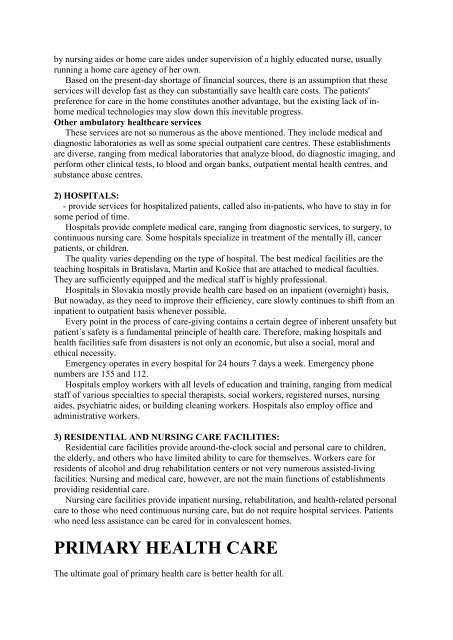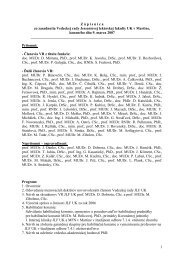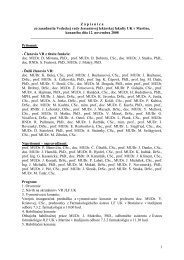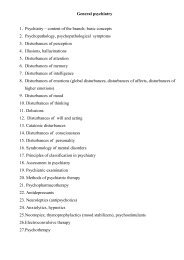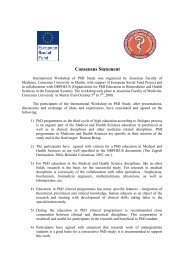health services
health services
health services
Create successful ePaper yourself
Turn your PDF publications into a flip-book with our unique Google optimized e-Paper software.
y nursing aides or home care aides under supervision of a highly educated nurse, usually<br />
running a home care agency of her own.<br />
Based on the present-day shortage of financial sources, there is an assumption that these<br />
<strong>services</strong> will develop fast as they can substantially save <strong>health</strong> care costs. The patients'<br />
preference for care in the home constitutes another advantage, but the existing lack of inhome<br />
medical technologies may slow down this inevitable progress.<br />
Other ambulatory <strong>health</strong>care <strong>services</strong><br />
These <strong>services</strong> are not so numerous as the above mentioned. They include medical and<br />
diagnostic laboratories as well as some special outpatient care centres. These establishments<br />
are diverse, ranging from medical laboratories that analyze blood, do diagnostic imaging, and<br />
perform other clinical tests, to blood and organ banks, outpatient mental <strong>health</strong> centres, and<br />
substance abuse centres.<br />
2) HOSPITALS:<br />
- provide <strong>services</strong> for hospitalized patients, called also in-patients, who have to stay in for<br />
some period of time.<br />
Hospitals provide complete medical care, ranging from diagnostic <strong>services</strong>, to surgery, to<br />
continuous nursing care. Some hospitals specialize in treatment of the mentally ill, cancer<br />
patients, or children.<br />
The quality varies depending on the type of hospital. The best medical facilities are the<br />
teaching hospitals in Bratislava, Martin and Košice that are attached to medical faculties.<br />
They are sufficiently equipped and the medical staff is highly professional.<br />
Hospitals in Slovakia mostly provide <strong>health</strong> care based on an inpatient (overnight) basis.<br />
But nowaday, as they need to improve their efficiency, care slowly continues to shift from an<br />
inpatient to outpatient basis whenever possible.<br />
Every point in the process of care-giving contains a certain degree of inherent unsafety but<br />
patient´s safety is a fundamental principle of <strong>health</strong> care. Therefore, making hospitals and<br />
<strong>health</strong> facilities safe from disasters is not only an economic, but also a social, moral and<br />
ethical necessity.<br />
Emergency operates in every hospital for 24 hours 7 days a week. Emergency phone<br />
numbers are 155 and 112.<br />
Hospitals employ workers with all levels of education and training, ranging from medical<br />
staff of various specialties to special therapists, social workers, registered nurses, nursing<br />
aides, psychiatric aides, or building cleaning workers. Hospitals also employ office and<br />
administrative workers.<br />
3) RESIDENTIAL AND NURSING CARE FACILITIES:<br />
Residential care facilities provide around-the-clock social and personal care to children,<br />
the elderly, and others who have limited ability to care for themselves. Workers care for<br />
residents of alcohol and drug rehabilitation centers or not very numerous assisted-living<br />
facilities. Nursing and medical care, however, are not the main functions of establishments<br />
providing residential care.<br />
Nursing care facilities provide inpatient nursing, rehabilitation, and <strong>health</strong>-related personal<br />
care to those who need continuous nursing care, but do not require hospital <strong>services</strong>. Patients<br />
who need less assistance can be cared for in convalescent homes.<br />
PRIMARY HEALTH CARE<br />
The ultimate goal of primary <strong>health</strong> care is better <strong>health</strong> for all.


